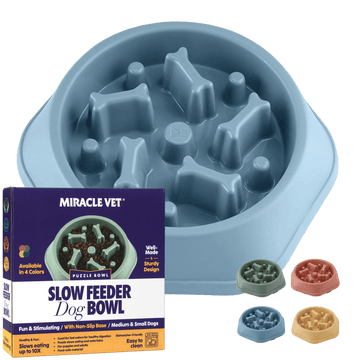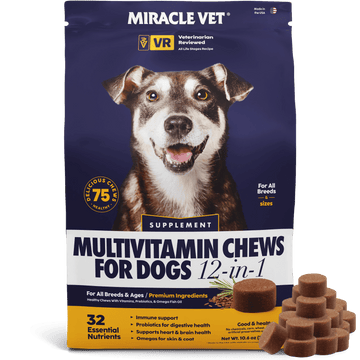
Inside the digestive system of every dog—from giant Great Danes to itty-bitty Poodles and every breed in-between—is a complex ecosystem of bacteria called the microflora.
This microflora consists of billions of microscopic bacteria, yeast, and protozoa.
That might sound like a bad thing, but it’s really not. These bacteria aren’t germs. They’re actually good for your dog! They have a symbiotic relationship, which means that they help improve your dog’s health and immune system.
Here at Miracle Vet, we’re big believers in the power of diet. We believe that when you feed your dog healthy foods, it makes for a healthier, happier dog.
Well, part of feeding your dog a healthy diet means keeping your dog’s digestive system packed with plenty of these gut-healthy bacteria. And the best way to do that is through the use of a high-quality probiotic.
What is a probiotic?
Probiotics are a form of beneficial bacteria that are good for us. They’re tiny microorganisms that live in our digestive tract, and help to keep us healthy.
Everyone’s digestive system—that means yours and your dog’s—is full of bacteria. But there are different kinds of digestive bacteria:
Probiotic Bacteria are healthy bacteria that have a beneficial effect on your dog—for example, they help to improve digestion and protect against illness.
Pathogenic Bacteria are unhealthy bacteria that can contribute to malnutrition, diarrhea, and even sickness or disease.
Here’s the important thing to realize: you can never eliminate the bacteria from your dog’s digestive system (and you wouldn’t want to!). No matter what you do, your dog’s intestinal tract will contain some kind of bacteria.
But you can have an effect on what kind of bacteria are in your dog’s system. And that’s where the use of probiotics can help to make your dog a healthier canine.
How do probiotics work?
Probiotics work to improve your dog’s health via several different mechanisms.
Improved Digestion
One of the big benefits of probiotics is that they help to improve digestion. That means that when you feed your dog a nutrient-rich food (like Miracle Vet dog food), your dog’s digestive system will be able to absorb more of the beneficial nutrients in their food.
Strengthened Immune System
Probiotics have also been shown to strengthen your dog’s white blood cells, as shown in this study published in the Journal of Nutrition which found that probiotics given to dogs improved their immune system and helped protect against infection.
Protecting Against Pathogens
Probiotics help to protect your dog’s body against harmful pathogens via several different methods.
One way they achieve this is by effectively “starving” unhealthy pathogens in your dog’s system. With the addition of more bacteria, competition for nutrients become stricter—which means there are fewer nutrients available for pathogens to eat.
Probiotics can also attach themselves to your dog’s gut wall, resulting in less available space for pathogenic bacteria in general.
Finally, probiotics can also help increase your dog’s production of lactic acid—an organic compound that helps to inhibit the growth of pathogenic bacteria by reducing gut pH. (Pathogenic bacteria tend to thrive in a more alkaline environment.)
This image gives an overview of some of the biggest benefits of probiotics for dogs:

In short, probiotics can help your dog to absorb more nutrients from their food while also protecting them against pathogens and disease.
What makes a good probiotic?
So what makes for a good probiotic? What should you look for in a probiotic supplement?
Vet Approval
One of the best things you can look for in a probiotic is a product that has been analyzed and approved by a veterinarian. This means that an expert has already studied the product in question and come to the conclusion that it is a healthy, high-quality probiotic.
Safety
When comparing probiotics, make sure to look for a product that is created in a medical-grade FDA facility that is registered in good standing with GMP (Good Manufacturing Practices). We also recommend looking for products that are made in the USA, where manufacturing standards are higher than in many other countries.
Number of Probiotics
Finally, keep in mind that every probiotic contains a different amount of beneficial probiotics. This is measured in CFUs (colony-forming units). Because there is no way to overdose on probiotics, the more CFUs in your probiotic...the better. The probiotic that we recommend, MiracleVet Omega Biotics, contain 2 billion CFUs per serving—making them the most potent probiotic on the market.
Are probiotics safe for dogs? Can a dog overdose on them?
Probiotics have been shown to be completely safe for dogs, with no negative effects or side effects. This has been demonstrated in multiple studies, like this 2009 study which found that dogs tolerate probiotics very well, with no safety concerns.
As for the question of overdose: practically speaking, there is no way to overdose on probiotics. Keep in mind probiotics are taken orally. So even if your dog did take too many, they would simply pass through your dog’s digestive system. A bit wasteful, perhaps, but it wouldn’t do any harm to your dog.
What is a prebiotic?
If probiotics are a supplement containing healthy gut bacteria, prebiotics are essentially “food” for those good bacteria. Prebiotics are best taken in combination with probiotics, so that the new bacteria being introduced in your dog’s digestive system will have the best chance of flourishing.
What problems do probiotics help to solve?
Increased probiotic bacteria can help resolve the following issues:
- Weak digestive system
- Loose stool
- Yeast overgrowth
- Bad breath
- Constipation
- Itching & scratching
- Allergies
- Digestive issues
- Gut-related problems
- Diarrhea
This is an incomplete list, but as you can see, probiotics can have a HUGE effect on your dog. That’s because digestive health is vitally important to your dog’s overall health and sense of well-being. This makes probiotics one of the most important supplements you should be giving your dog regularly.
Can I feed my dog probiotics that were made for humans?
Feeding human probiotics to your dog is not recommend. Humans and dogs have significant differences in their digestive systems—including different levels of stomach acids, different digestive enzymes, and and different probiotic strains that will contribute to ideal health. For those reasons, you should give your pet a probiotic supplement made specifically for dogs.
Can you give your dog probiotics for a long period of time?
Yes! Because probiotics help support better health and immune function, it is recommended to give them to your dog on a regular basis for the entirety of their lifespan.
What’s the best probiotic for dogs?
Now that you know the many awesome health benefits of probiotics for dogs, you may be interested in trying out a probiotic supplement for your furry best friend.
If that’s the case for you—if you want your dog to experience all the amazing benefits of gut health, improve coat & skin, and better immunity—then check out Omega Biotics by MiracleVet.
This product hits all our wishlist items:
- It’s vet-approved
- It’s produced in a medical-grade FDA facility
- It contains prebiotics as well as probiotics
- It contains the most CFUs of any brand (over 2 billion)
If you’re interested in giving it a try, click here to learn more about MiracleVet Omega Biotics.









